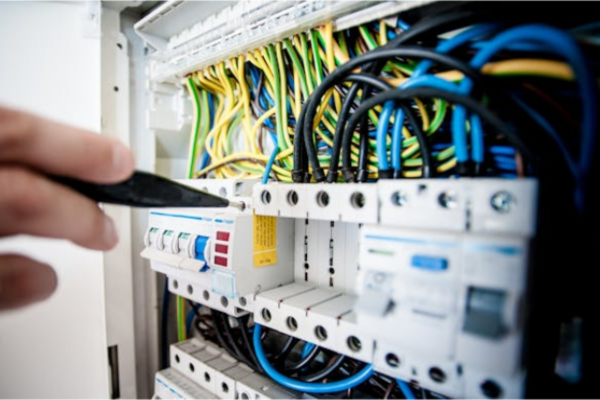5 Tell-Tale Signs that You Should Call an Emergency Electrician Sooner Rather than Later
by Nabamita Sinha Blog 16 June 2025

Do you recall when the last electrical inspection in your house took place? Have you begun to notice a decrease in your electricity when you need it? Your electrical wiring system and switchboard require repair or upgrading.
When the power goes out, you can call emergency electrician Canberra’s resident to have your home safe and up to code. Read on as we take a closer examination of the signs to call emergency electrician.
Signs of Trouble are Easier to Spot than You Think
Dramatic electrical issues do not typically occur minute by minute. Most emergencies would have been developing for a bit, and you would have a feeling that something is amiss.
It is important to note what these indicators are. Below is the list of the most important signs to call emergency electrician.
1. A Burnt Smell When Something’s On
One of the more prevalent signs that something is amiss in your electrical system is a burning odor that comes with one of your appliances or outlets in use. This is usually the result of frayed or worn internal wires, which have begun to burn.
Some of the more prevalent reasons for the burning odor are:
- Shoddy wiring
- Circuit overload
- Marauding wires
- Malfunctioning appliance
- Malfunctioning switches or sockets
- Burnt outlets
- Worn cords
If you can find where the odor is, turn off the outlet and unplug any devices that are connected to it. Turn the outlet off until an electrician can check on the problem.
If you have no idea where the burning smell is, or if there is also smoke, turn the power off at the master switch and call your plumber right away.
2. Power Outlets are Heating Up When Used
A power outlet should not heat up when being used. Outlets with high age could slightly heat up when being used for long periods. If an outlet is excessively hot, turn it off and do not use it.
Your electrician will inspect loose or damaged wiring. Keep in mind that neglecting this problem could result in more hazardous problems.
3. Your Lights are Flickering All the Time
Random flickering light is not usually something to worry about and can sometimes be caused by a dip in power supply.
But when your lights keep incessantly flickering or frequently dim, that is an indication that something else is brewing.
Some of the causes of lights flickering include:
- Overloaded circuits
- Worn-out wiring
- Damaged light switch
- Voltage fluctuations
- Loose light bulbs
If it is one light only that is flickering, turn it off and leave it off for several minutes. If the light flickers when you turn it on, there might be something amiss. Ask your electrician for a recommendation or make an appointment for it to be tested.
4. You Get an Electrical Shock from a Wire or Outlet
One of the largest tell-tale hints at an electrical issue is a person getting shocked when they look at an outlet or a plug. Remember, if the appliance has a plug, the plug may be the issue and not your main power.
Change the plug and see if the issue persists. If you’re not comfortable changing the plug, speak to your electrician about checking the appliance, plug, and outlet. It’s a good idea to keep the appliance and the outlet off until the electrician arrives.
5. You Live in an Old House
Regardless of how well you maintain your home or how frequently you perform repairs on the broken appliances, your electrical switchboard will eventually require replacement.
This is due to the fact that older devices were not designed to handle the demands of modern homes.
To achieve this, look at how many appliances you used 10 or 15 years ago compared to the appliances, gadgets, and devices you’re currently charging.
An older home is more likely to have electrical problems because they cannot keep up with the demand.
In addition to this, older switchboards are also employing parts that do not meet legal standards of conformity.
Having your switchboard upgraded will get your home compliant, and it will also employ energy-efficient parts, which will minimize your overall power usage.
You should also have a seat with your electrician and discuss any other appliances that you will be installing in the future. This will allow them to update your switchboard to meet both your current and future power requirements.
Potential Effects of a Negative Electrical Issue
If you ignore the signs to call emergency electrician for electrical problems, there will be significant consequences to that, such as;
- Safety hazards – It is a serious safety hazard ignoring certain electrical problems like faulty safety switches can cause accidents, that can lead towards harming those who are living in the house.
- Added Expenses – If left for later, these minor electrical issues can lead to bigger problems with more significant consequences, which will cost more to fix in the future.
- Inconveniences – With a constant tripping circuit breakers, lights that won’t stop flickering or frequent power outages can easily disrupt from your day to day activities.
- Damage to Appliances and devices – It is possible that electrical issues can easily manage to damage electrical devices and major appliances. With constant fluctuations and certain power surges causing from electrical faults, it can easily shorten the lifespan.
- Decreased Property Value – If you know about your home having any history of unresolved electrical problems and issues, then it can easily decrease the value of your property. This will in turn discourage potential buyers from demanding a lower price value for the property.
Final Thoughts
When you’re dealing with the electrical wiring in your home, it’s never a good idea to ignore any potential issues, no matter how big or small.
Rather, err on the side of caution and have your switchboard and wiring assessed if you’re noticing signs to call emergency electrician any of the signs we’ve highlighted.
If your house is an old house, or your energy usage has risen, it is most prudent to have a routine inspection conducted for a possible switchboard upgrade. This will ensure that the household wiring and electrical appliances are safe and up to code.



































































































